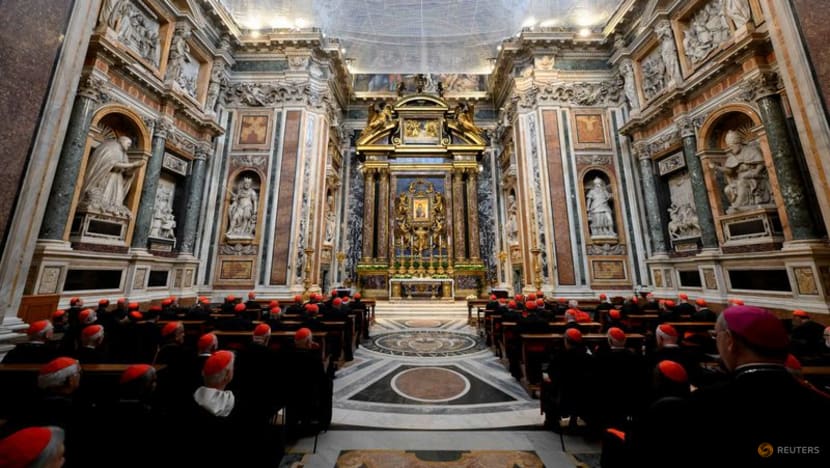Conclave to elect new pope starts May 7

Cardinals attend vespers prayers after visiting the tomb of Pope Francis in the papal basilica of Santa Maria Maggiore in Rome on Apr 27, 2025. (Photo: Reuters/Vatican Media/Francesco Sforza)
VATICAN CITY: Catholic cardinals will meet on May 7 to start voting for a new pope, the Vatican announced on Monday (Apr 28), a week after the death of Pope Francis.
So-called "Princes of the Church" under the age of 80 will meet in the Sistine Chapel to choose a new religious leader of the world's 1.4 billion Catholics.
The date was decided at a meeting of cardinals of all ages early on Monday, two days after the funeral of Francis, who died on Apr 21 aged 88.
The Church's 252 cardinals were called back to Rome after the Argentine's death, although only 135 are eligible to vote in the conclave.
They hail from all corners of the globe, and many of them do not know each other.
But they already had four meetings last week, so-called "general congregations", where they began to get better acquainted.
Cardinal Gualtiero Bassetti, 83, a former head of the Italian bishops' conference, said there was a "beautiful, fraternal atmosphere".
"Of course, there may be some difficulties because the voters have never been so numerous and not everyone knows each other," he told Italy's Corriere della Sera newspaper.
Pope Francis made a priority of appointing cardinals from places that had never had them, such as Myanmar, Haiti, and Rwanda.
The Vatican on Monday closed the Sistine Chapel, where voting will take place under Michelangelo's 16th-century ceiling frescoes, to begin preparations.
So far there are few clues as to who cardinals might choose.
"I believe that if Francis has been the pope of surprises, this conclave will be too, as it is not at all predictable," Spanish Cardinal Jose Cobo told El Pais in an interview published on Sunday.
Francis was laid to rest on Saturday with a funeral and burial ceremony that drew 400,000 people to St Peter's Square and beyond, including royalty, world leaders and ordinary pilgrims.
On Sunday, about 70,000 mourners filed past his marble tomb in the Santa Maria Maggiore Basilica in Rome, after the "pope of the poor" opted to be buried outside the Vatican's walls.
BOOKMAKERS' ODDS
With conflicts and diplomatic crises raging around the world, Italian Cardinal Pietro Parolin, who under Francis was secretary of state - the pope's number two - is for many the favourite to succeed him.
British bookmakers William Hill put him slightly ahead of Filipino Luis Antonio Tagle, the Metropolitan Archbishop emeritus of Manila, followed by Ghana's Cardinal Peter Turkson.
Next in their odds come Matteo Zuppi, the Archbishop of Bologna, Guinea's Cardinal Robert Sarah, and Pierbattista Pizzaballa, the Latin patriarch of Jerusalem.
While Francis' efforts to create a more compassionate Church earned him widespread affection and respect, some of his reforms angered the Church's conservative wing, particularly in the United States and Africa.
The first pope from Latin America, Francis largely tried to open up the often staid Church to new conversations. He allowed debate on issues such as ordaining women as clergy and outreach to LGBTQ Catholics.
German Cardinal Walter Kasper told the La Repubblica newspaper that the outpouring of mourners for Francis indicated that Catholics wanted the next pope to continue with his reforming style of papacy.
"The people of God voted with their feet," said Kasper, who is 92 and will not take part in the conclave. "I am convinced that we must go ahead in the footsteps of Francis."
However, a bloc of conservative cardinals is certain to push back against this and seek a pope who reasserts traditions and restricts Francis' vision of a more inclusive Church.
Roberto Regoli, a professor of Church history and culture at the Pontifical Gregorian University in Rome, told AFP that the cardinals would be looking "to find someone who knows how to forge greater unity".
"We are in a period in which Catholicism is experiencing various polarisations, so I don't imagine it will be a very, very quick conclave," he said.
Bassetti, who is too old to participate, said however, he thought it "will not be long".
The past two conclaves, in 2005 and 2013, each lasted just two days.
About 80 percent of the cardinal electors were appointed by Francis - though that is no guarantee they will pick a successor in his likeness.
Most are relatively young, and for many it is their first conclave.
"WE NEED A COURAGEOUS LEADER"
The vote is highly secretive and follows strict rules and ceremonial procedures. The process could take several days, or potentially longer.
There are four votes per day - two in the morning and two in the afternoon - until one candidate secures a two-thirds majority.
Fewer than half of those eligible to vote are European.
"The future pope must have a universal heart, love all the continents. We must not look at colour, at origin, but at what is proposed," Cardinal Dieudonne Nzapalainga from the Central African Republic told the Italian newspaper Il Messaggero.
"We need a courageous leader, a bold one, capable of speaking forcefully, of holding the helm of the Church steady even in storms ... offering stability in an era of great uncertainty."
Patrizia Spotti, a 68-year-old Italian visiting Rome for the 2025 Jubilee holy year, told AFP on Monday she hoped the new pontiff "will be a pope like Francis".
It was a difficult time for Catholicism, she said.
"Churches are empty. And the Church itself has made mistakes, all the scandals with the children," she said, referring to the widespread revelations of clerical sex abuse.















